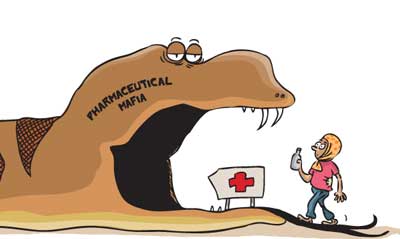Reply To:
Name - Reply Comment
With the National Medicines Regulatory Authority (NMRA) getting back to work after its chairman Prof. Laal Jayakody and Chief Executive Officer Prof. Krishantha Weerasuriya agreed to come back to their posts, it is pertinent to look at some of the details about how international pharmaceutical networks function, what it does in Sri Lanka and what we as a country need to do to prevent undue influence on our health sector.

Transparency International UK, the British Chapter of Transparency International in a report titled “Transparency and Good Governance in Global Health” says Corruption in any sector is damaging to society and the economy. In the pharmaceutical and healthcare sector it puts health and life at risk.
Worldwide 70 % of people said they had paid a bribe when dealing with the medical sector in a global survey of 114,000 citizens in 2013, and 45 % believed medical and health services to be corrupt or extremely corrupt. Other surveys, such as Transparency International’s Bribe Payers’ index reinforced this finding. With global health spending soaring to about 7 trillion US dollars annually, the size of funds healthcare sector makes it a lucrative and attractive target for corruption.
Estimates of global health public procurement funds lost to corruption range from ten to twenty five percent. Yet, if only one percent of global health spending were lost to corruption, representing US$70 billion, and it was put back into healthcare, this would be US$10 billion more than the sum needed to achieve the Millennium Development Goals on health. Staggering, is it not.
Other factors make this a sector that is particularly vulnerable to corruption. It is a complex, global sector with asymmetrical information flows that require specialists to understand what is really happening, the report says. It has multiple actors and an unusual interplay between the public and private sectors, as we see clearly in Sri Lanka.
As in other sectors, globalisation has brought new challenges, with companies operating in new markets in which corruption is prevalent, and companies from those markets starting to operate internationally.
Corruption has consequently taken root in the pharmaceutical and healthcare sector. It has been observed in the development of drugs and patents, in procurement, in the delivery of health and medical services and through medical insurance systems. In addition, the lack of transparency has resulted in the sector losing the trust of its customers. Instead of providing healthcare for the benefit of patients and society, there is a danger that the sector is perceived to be enriching itself, often at the expense of those that need it most.
Building on 20 years of experience in this and other sectors, Transparency International UK is taking up the challenge of analysing, understanding and combating corruption in this vital sector, it says. It aims to do so through a coordinated international initiative, working in close coalition with Transparency International national chapters throughout the world and other partners from the public and private sector who share its objectives.
It has embarked on a pilot project, in the expectation of launching a full programme within twelve months to produce new evidence and information, and provide a clearly articulated case that will lead to policy changes and real progress in understanding corruption and improving anti-corruption resilience. “We have a vision, and are forming our strategy, and in due course will be looking for funds. For now, we are looking for expertise, insight, and above all, for allies who wish to work with us to pursue a critical issue for the benefit of global health,” the report says. We hope Transparency International Sri Lanka will join health action groups such as the People’s Movement for the Rights of Patients (PMRP) to ensure the implementation of the new National Medicinal policy which is intended to restore a health service where the well-being of the patients is given top priority. As a first step the NMRA has sent to the Health Ministry regulations that when gazetted will gradually make quality drugs available to the people at affordable prices.
At present about 15,000 varieties of drugs have been registered for import and sale. For instance, Sri Lanka has imported about hundred varieties of the antibiotic Amoxiline at prices ranging from about Rs. 5 at Osusala outlets to Rs. 100 at private pharmacies. Health Minister Rajitha Senaratne said this week he hope the NMRA would reduce the number of imported drugs with a maximum of four varieties for most of the essential or lifesaving drugs.